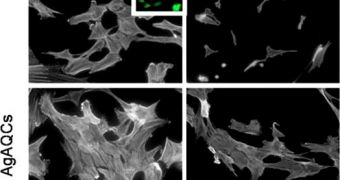A group of investigators from Spain say that they managed to develop a new method of protecting human cells against ethanol damage. This compound is contained in alcohol, and adding it into the bloodstream can have negative repercussions on the way cells function. But the science team learned that, by adding a very small amount of silver nanoparticles to the mix, the destructive action of ethanol is significantly impaired, ScienceDaily reports. Details of the work appear in the latest issue of the esteemed Journal of the American Chemical Society (JACS).
“The results of the study show that these clusters of small numbers of silver atoms catalyze ethanol oxidation at similar concentrations to those found in the blood of alcoholics and at values of membrane potential and pH that are compatible with those exhibited by mammalian cells,” says University of Barcelona (UB) Faculty of Medicine Department of Cell Biology, Immunology and Neurosciences professor Gustavo Egea,
The scientist, who was the leader of the new study, also holds an appointment as an affiliate researcher at the Institute of Nanosciences and Nanotechnology (IN2UB) and the August Pi i Sunyer Miomedical Research Institute (IDIBAPS). Experts from the University of Santiago de Compostela Magnetism and Nanotechnology laboratory also participated in this investigation.
The study was conducted on astrocytes, which are nerve cells that accompany neurons. They are very often used to model various conditions pertaining to alcoholism, and so it stands to reason that they be selected for the new work as well. The researchers exposed some cell cultures to ethanol, and then applied the silver nanoparticles to the mix. Generally, when exposed to ethanol, the cells enter a stage called programmed cell-death, and experience an alteration of the actin cytoskeleton. When silver is applied, the cytoskeleton remains intact, and cellular death commands are canceled, the researchers say,.
“So, the harmful effect of ethanol on astrocytes is mitigated by the silver nanoparticles, which act as a cytoprotective agent,” says UB Department of Cell Biology, Immunology and Neuroscience lecturer and first author of the paper, Javier Selva. “This is a promising field in electrochemistry applied to cell biology, which harnesses the different properties of nanoparticles formed by very small numbers of atoms, referred to generically as atomic clusters,” Egea concludes.

 14 DAY TRIAL //
14 DAY TRIAL //